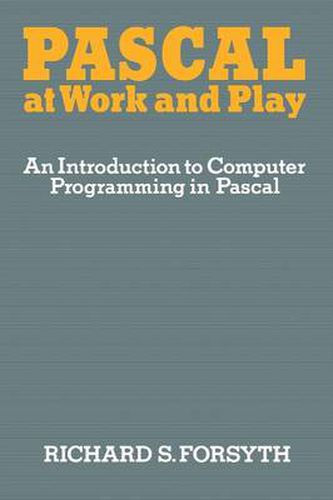Readings Newsletter
Become a Readings Member to make your shopping experience even easier.
Sign in or sign up for free!
You’re not far away from qualifying for FREE standard shipping within Australia
You’ve qualified for FREE standard shipping within Australia
The cart is loading…






This title is printed to order. This book may have been self-published. If so, we cannot guarantee the quality of the content. In the main most books will have gone through the editing process however some may not. We therefore suggest that you be aware of this before ordering this book. If in doubt check either the author or publisher’s details as we are unable to accept any returns unless they are faulty. Please contact us if you have any questions.
This is both a first and a second level course in Pascal. It starts at an elementary level and works up to a point where problems of realistic complexity can be tackled. It is aimed at two audiences: on the one hand the computer professional who has a good knowledge of Cobol or Fortran but needs convincing that Pascal is worth learning, and on the other hand the amateur computer enthusiast who may have a smattering of Basic or may be an absolute beginner. Its approach is based on two principles that are not always widely recognized. The first is that computing is no longer a specialist subject. In the early days of computing a priesthood arose whose function was to minister to those awesome, and awesomely expensive, machines. Just as in the ancient world, when illiteracy was rife, the scribes formed a priestly caste with special status, so the programmers of yesteryear were regarded with reverence. But times are changing: mass computer- literacy is on its way. We find already that when a computer enters a classroom it is not long before the pupils are explaining the finer points of its use to their teacher - for children seem to have greater programming aptitude than adults. This book, it is hoped, is part of that process of education by which the computer is brought down to earth; and therefore it attempts to divest computing of the mystique (and deliberate mystification) that still tends to surround the subject.
$9.00 standard shipping within Australia
FREE standard shipping within Australia for orders over $100.00
Express & International shipping calculated at checkout
This title is printed to order. This book may have been self-published. If so, we cannot guarantee the quality of the content. In the main most books will have gone through the editing process however some may not. We therefore suggest that you be aware of this before ordering this book. If in doubt check either the author or publisher’s details as we are unable to accept any returns unless they are faulty. Please contact us if you have any questions.
This is both a first and a second level course in Pascal. It starts at an elementary level and works up to a point where problems of realistic complexity can be tackled. It is aimed at two audiences: on the one hand the computer professional who has a good knowledge of Cobol or Fortran but needs convincing that Pascal is worth learning, and on the other hand the amateur computer enthusiast who may have a smattering of Basic or may be an absolute beginner. Its approach is based on two principles that are not always widely recognized. The first is that computing is no longer a specialist subject. In the early days of computing a priesthood arose whose function was to minister to those awesome, and awesomely expensive, machines. Just as in the ancient world, when illiteracy was rife, the scribes formed a priestly caste with special status, so the programmers of yesteryear were regarded with reverence. But times are changing: mass computer- literacy is on its way. We find already that when a computer enters a classroom it is not long before the pupils are explaining the finer points of its use to their teacher - for children seem to have greater programming aptitude than adults. This book, it is hoped, is part of that process of education by which the computer is brought down to earth; and therefore it attempts to divest computing of the mystique (and deliberate mystification) that still tends to surround the subject.